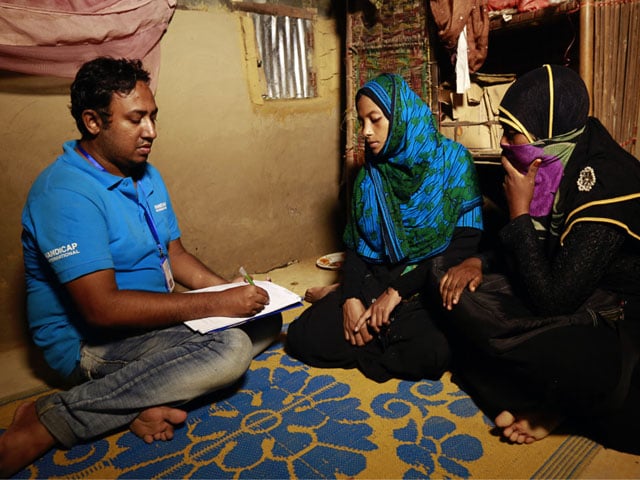Bangladesh crisis: Handicap International (HI) beefs up its emergency assistance
 More than 500,000 Rohingya have fled to Bangladesh since the end of August from neighbouring Myanmar. Handicap International (HI) is stepping up its humanitarian aid effort in response to this crisis, which is unprecedented in the region. Since 25 August, the organisation has already supplied humanitarian assistance to 15,000 people.
More than 500,000 Rohingya have fled to Bangladesh since the end of August from neighbouring Myanmar. Handicap International (HI) is stepping up its humanitarian aid effort in response to this crisis, which is unprecedented in the region. Since 25 August, the organisation has already supplied humanitarian assistance to 15,000 people.

Women from a refugee camp waiting for food aid | A. Islam/Handicap International
Handicap International has set up seven mobile teams. These teams of physiotherapists, psychologists, social workers and children’s activity organisers visit refugee camps to identify extremely vulnerable people (pregnant women, children, older people and people with reduced mobility), direct them to available services, supply them with immediate rehabilitation or psychological assistance, and organise play activities for children traumatised or stressed by their experiences.
In partnership with a local organisation, Center for disabilities and development, Handicap International also runs a vehicle fully-equipped for physiotherapy sessions and taking measurements prior to orthopaedic-fitting, and transports toys for children’s play sessions and so on, capable of travelling to areas previously too isolated to reach, and which will also support the work of the mobile teams.

A. Islam/Handicap International
Handicap International has also set up four welcome points to provide advice on hygiene, cholera prevention, the distribution of humanitarian assistance, and so on, and to supply rehabilitation care, psychological support sessions and basic medical care for less serious injuries. These welcome points are located in new refugee camps. These points welcome 50 people on average a day. Three additional welcome points will be set up over the coming days.
Handicap International is working in partnership with the United Nations High Commission for Refugees (UNHCR) to identify people with special needs (extremely vulnerable people such as pregnant women, children, older people and people with reduced mobility) in transit points set up by the UNHCR.
Some 100 Handicap International staff members and 200 voluntary workers are currently providing assistance to Rohingya refugees. Some 700 people have already been given rehabilitation care, 4,000 have received emergency psychological support, and we have recorded nearly 6,000 extremely vulnerable people.




